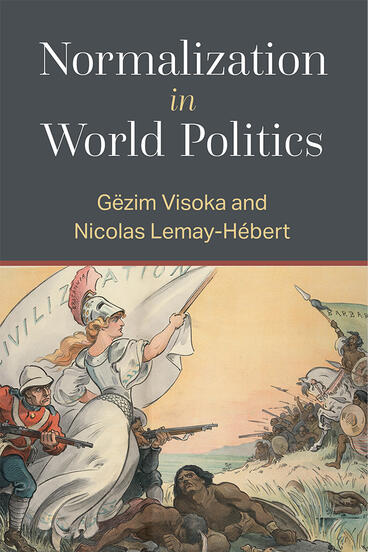Normalization in World Politics
The imposition of normalcy on fragile states and crises and its implications for world politics
Description
As we face new challenges from climate change and the rise of populism in Western politics and beyond, there is little doubt that we are entering a new configuration of world politics. Driven by nostalgia for past certainties or fear of what is coming next, references to normalcy have been creeping into political discourse, with people either vying for a return to a past normalcy or coping with the new normal.
This book traces main discourses and practices associated with normalcy in world politics. Visoka and Lemay-Hébert mostly focus on how dominant states and international organizations try to manage global affairs through imposing normalcy over fragile states, restoring normalcy over disaster-affected states, and accepting normalcy over suppressive states. They show how discourses and practices come together in constituting normalization interventions and how in turn they play in shaping the dynamics of continuity and change in world politics.
Gëzim Visoka is Associate Professor of Peace and Conflict Studies in the School of Law and Government at Dublin City University, Ireland.
Nicolas Lemay-Hébert is Senior Lecturer, Department of International Relations, Coral Bell School of Asia Pacific Affairs, Australian National University, Australia.
Reviews
“A searing exploration of the variety of ways that ‘normalcy’ functions in contemporary international affairs to justify and sustain a particular vision of acceptable politics. The authors’ critical mapping of normalization practices provides ample food for thought for anyone interested in the current condition and future prospects of liberal international order.”
—Patrick Thaddeus Jackson, American University
- Patrick Thaddeus Jackson
“Normalization through normative manipulation is liberalism in action, much in evidence as the global liberal order implodes. In this conceptually innovative book, Visoka and Lemay-Hébert identify three distinctive situations in which dominant states set rules for ‘helping’ outlier states become normal and meticulously document interventionary normalization in state practice.”
—Nicholas Onuf, Florida International University
- Nicholas Onuf
“It is an excellent book: sophisticated in the argument, elegant in presentation and style. The authors convincingly present international interventions as complex governmentality arrangements where discourses and practices are deployed to normalize and discipline states. Usually, studies tend to focus solely on approaches to state-building or resilience or development or disaster-management, but the stakes here are higher.”
—Pol Bargués, CIDOB (Barcelona Centre for International Affairs)
- Pol Bargues
“This book is well-written and innovative in its conceptual contribution to the discipline of International Relations. As the notion of ‘normalization’ captures a vast number of political phenomena, it resonates with the scholarship that investigates the discursive and lived effects of wars, oppression, and disasters.”
—Stefanie Kappler, Durham University
- Stefanie Kappler
“Normalization in World Politics is a conceptually rich and compelling book that presents a novel and engaged theory of normalization. It will be of interest to scholars across the discipline for some time to come.”
- Perspectives on Politics
--Perspectives on Politics

